The René Moawad Foundation concludes the ‘Sustainable Energy Consumption’ project, funded by the EU, in the presence of 250 mayors from the various parts of the country
Mingasson: A successful partnership between the EU, RMF and local authorities
As part of the SUDEP projects, funded by the EU, RMF concluded the ‘Towards Sustainable Energy Consumption In Select Local Communities Of Northern Lebanon’ project. The event was attended by a large gathering under the patronage of the Minister of Energy and Water, Cesar Abi Khalil.
The event took place at Hotel Royal – Dbayeh and was attended by Irène Mingasson, Head of Unit Regional Cooperation Neighbourhood South DG NEAR, the European Commission; Dr Joseph Al Assad representing the Minister of Energy and Water Cesar Abi Khalil; Peter Farah representing the Minister of Social Affairs Pierre Bou Assi; RMF’s Executive Director Michel Moawad; Cyril Dewaleyne, Energy and Climate Change Programme Manager, DG NEAR, the European Commission; Carole Rigaud Project Manager, EU Delegation to Lebanon; in addition to presidents of Municipal Unions, more than 250 mayors from the various parts of Lebanon, technical experts and representatives of donors and organisations.
The event started with the Lebanese National Anthem and the European Anthem. A video summarizing the main objectives of the project was then shown. More than 4000 people, residing in Ardeh, Harf Ardeh, Beit Awakar and Beit Obeid in the Zgharta District, benefited from the project that held the slogan ‘Ardeh is Green’, and focused on the protection of the environment.
The project’s goals were: Raising awareness on water consumption, and putting together a model for municipal work by moving forward with the implementation of sustainable energy measures that allow proper energy consumption in local communities and limit the high expenses. Through this project, the residents of Ardeh and surrounding towns created a sustainable environment that enhances the quality of living and respects the environment-friendly measures.
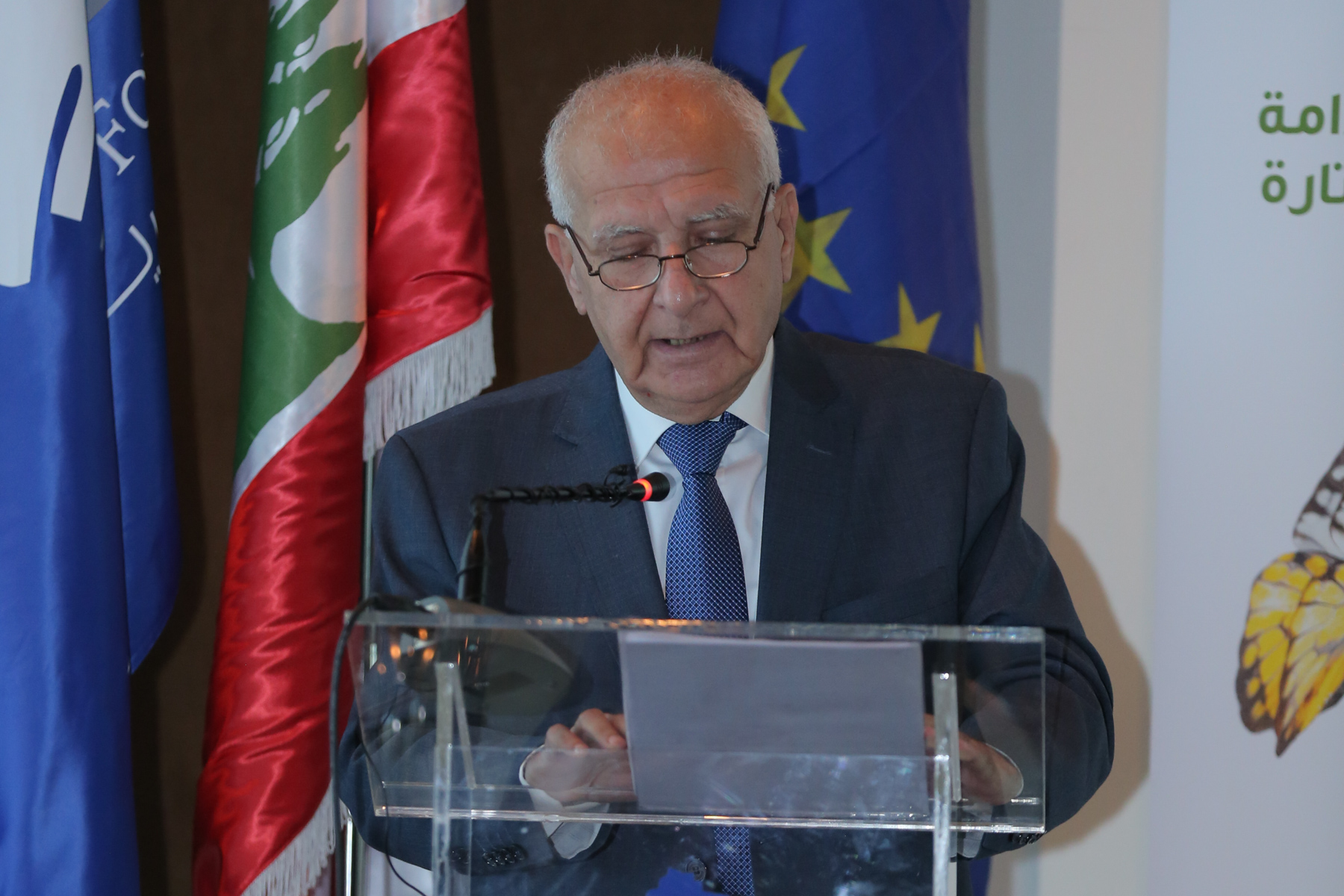
The mayor of Ardeh, Habib Latouf, gave a speech in which he enumerated all the aspects that the project dealt with, and expressed his wish that this successful experience be repeated in all the neighbouring towns and all of Lebanon. He also thanked “the EU and all the donor-organizations for creating a protective web for our country and our towns by funding activities that have positive effects and great benefits for Lebanese”. He extended his thanks to the Ministry of Energy and Water and RMF for their thorough follow up in various steps of the project: The planning and preparation steps, finalizing the needed studies, ensuring the funding, and diligently executing all the implementation steps.
Moawad
RMF’s Executive Director Michel Moawad spoke next. He expressed his happiness to be part of the gathering, and his pride about the efficient partnership with the EU, and about being part of the successful undertaking that the ‘Towards Sustainable Energy Consumption In Select Local Communities Of Northern Lebanon – SUDEP’ project turned about to be, benefiting Ardeh, Harf Ardeh, Beit Awakar and Beit Obeid. He explained that this project was in partnership with the Ardeh Municipality and was executed by RMF. The cost was 1 Million and 44 thousand Euro, 80% of which was funded by EU as part of the SUDEP projects, while RMF funded the remaining part.
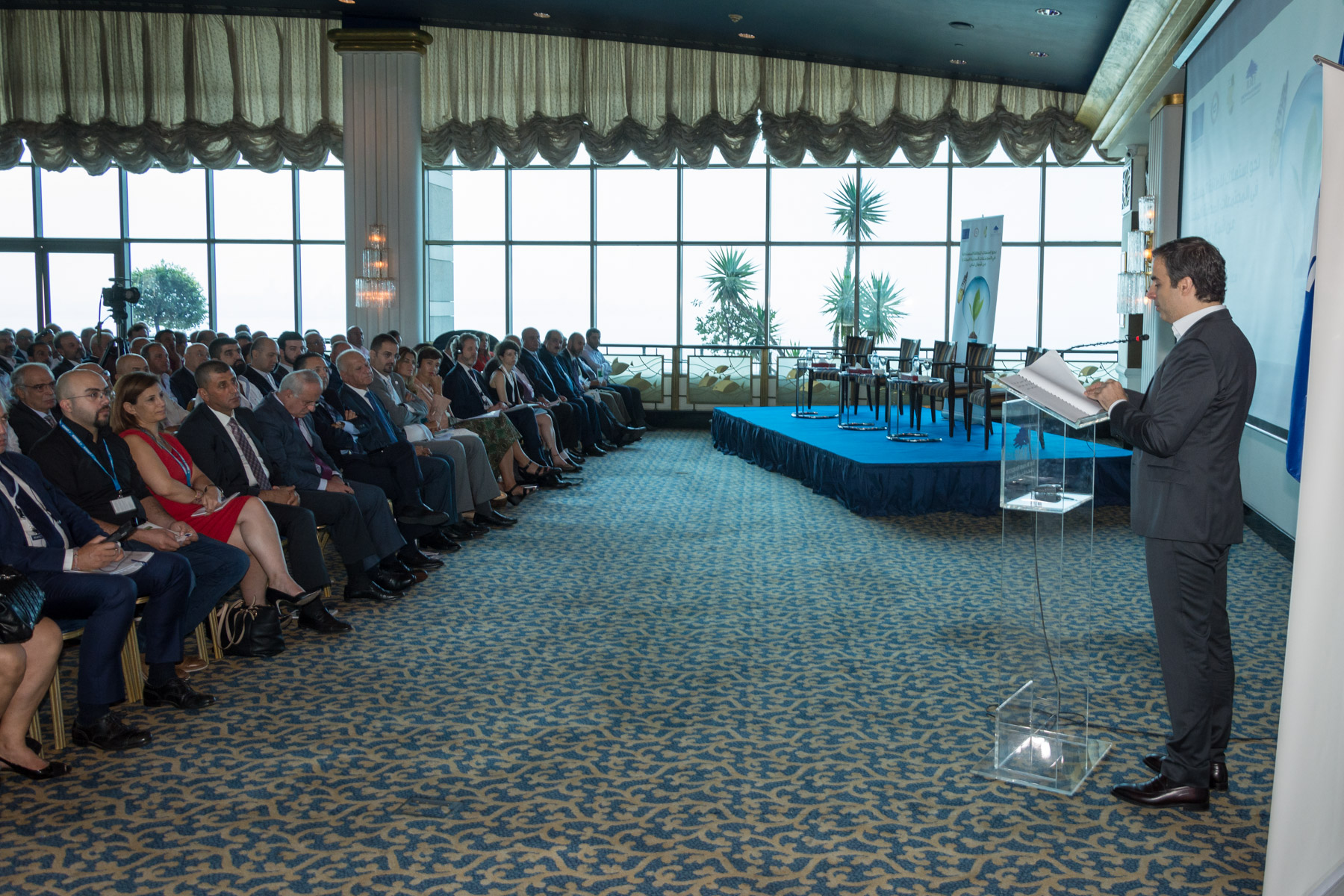
Moawad summarized the various achievements of the project by naming 3 of them.
– The first achievement he mentioned was fixing LED lights on public roads and in public squares that run on solar energy. “By this, he said, in addition to the direct environmental dimension of the project, awareness was raised on energy consumption. The municipality is now able to save 65% from its electricity expenditure, which is between 35,000 and 40,000 $ per year, that can now be allocated for development projects.”
– The second achievement was the fact that the project allowed 300 houses to enjoy hot water via solar energy. “We did some modification works in the houses, Moawad said, to reduce electrical power consumption, which will allow each house to save up to 40 $ per month on their electrical bill.”
– The third achievement is working on a general plan for Ardeh, Harf Ardeh, Beit Awakar and Beit Obeid, under the title ‘Ardeh is Green’ to rationalize power consumption. This plan has “deeper and long-term goals, Moawad clarified, which we should now start spreading in our large and small towns and civil communities… the soonest the best.”
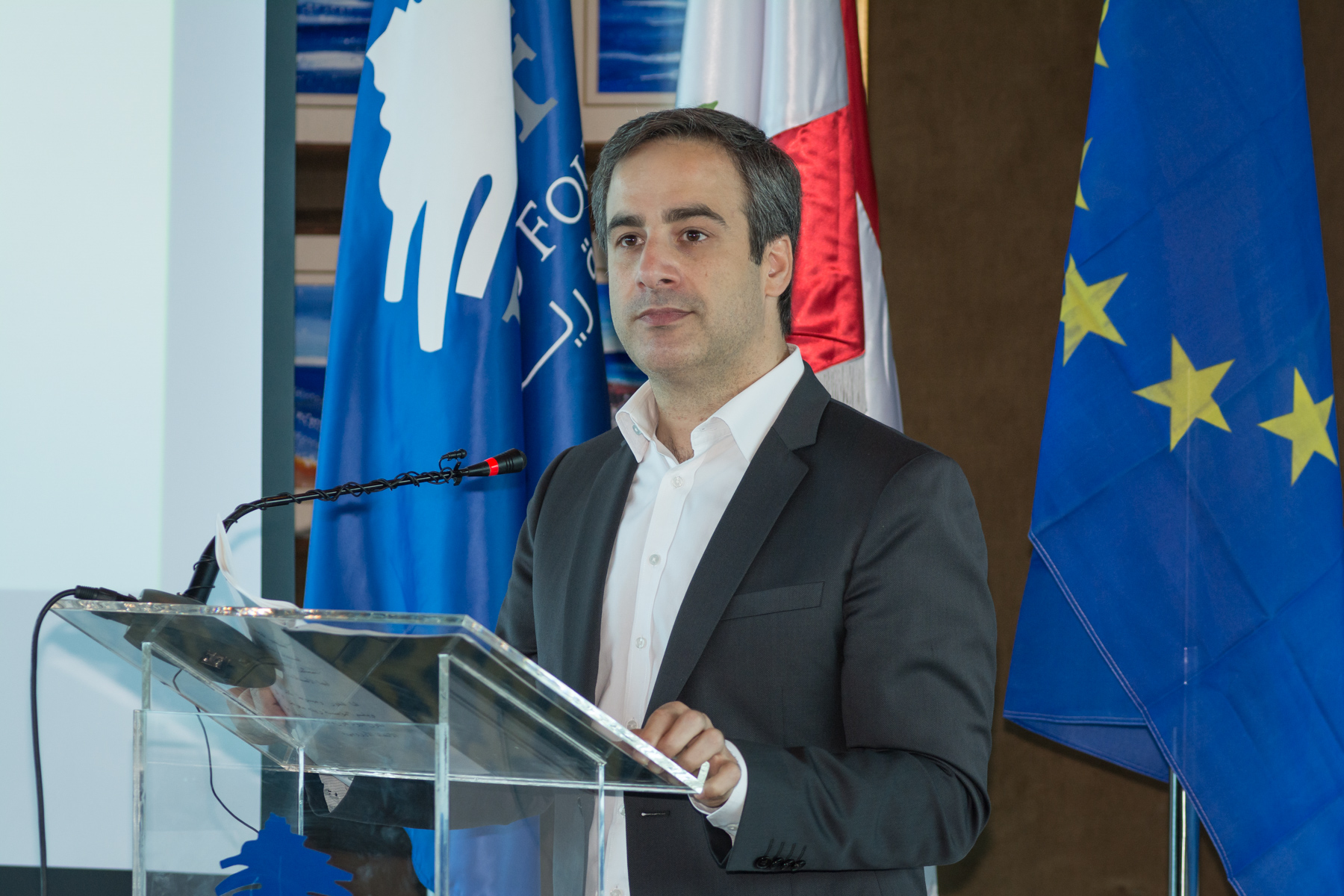
Moawad stressed that the project had in fact 3 dimensions:
– The first dimension is the environmental one which has to do with spreading awareness on how to rationalize power consumption. He expressed his sadness that “our social education had in it a culture of throwing garbage from cars’ windows, overusing electrical power and water in our houses even when we don’t need it, cutting trees for heating purposes and disposing of our sewage and waste waters in the sea and in rivers…” He added: “Our forests have disappeared. Our sea has reached such a level of pollution that it is not possible to swim in it anymore. Our cities, towns and villages are completely polluted. Even the air that we breathe is polluted. He are paying today a heavy price for these bad habits that we have indulged in. It is costing us our Natural wealth, our living environment, our economy, in addition to our health due to the illnesses it is generating. Therefore, the least of our duties is to re-educate our society on the essential environmental principles, amongst which the importance of rationalized consumption.”
Moawad explained that “the project was executed in Ardeh, which is by the Rachiine River. Many of you know how much we struggled and still are due to the level of pollution in the river. This pollution is not only harming the health of the people living there, but has strongly affected the economy of the region which is based on agriculture and riverside tourism.” He added that “with the help we have received from the donors and the cooperation of Minister Cesar Abi Khalil, we have put together the required funds and have succeeded in putting the proper solutions on the right track. We hope that very soon, the implementation will start.”
– The second dimension is the development dimension, added Moawad. He explained: “In this project, it is not just about the municipality saving money through reduced electricity bills. But the project has built a model of a successful tripartite cooperation between (1) international donors who have the financial capacities, like the EU in the present project; (2) NGOs like RMF, which has put its experience and capacities for the execution of the project; and (3) Local Authorities represented by the municipalities which are the best positioned to know the needs to their communities and must hold an essential role in the development policies in Lebanon. This tripartite cooperation does not eliminate the role of the central Government. On the contrary, this project for instance wouldn’t have succeeded without the cooperation of the Ministry of Energy. The Minister of Energy and Water’s patronage proves that he understands the importance of decentralization, and is giving the municipalities a bigger role in the implementation of development.
– The third dimension that Moawad mentioned is the social dimension, in a broad way. He explained that “respecting the environment isn’t exclusive for the rich countries’ governments and organizations. In fact, the respect for the environment is the basis for sustainable economic and social growth in any society. The present project is a proof to that.”
He added: “The importance of the project is not only what has been and is being executed in Ardeh, Harf Ardeh, Beit Awakar and Beit Obeid, and not only the 4000 people who have benefited directly from it. Its higher importance is that it represents a model that should be propagated as part of a national strategy that we have to draw together. The importance of the project is that we are all present here today: The EU as a donor, the Ministry of Energy, more than 250 municipalities and representatives of the Central Bank of Lebanon which offers programs to fund municipal energy projects… All are here because this project offers a model that we have to see how to propagate in Lebanon. We want to spread this model through municipalities and through the private sector.”
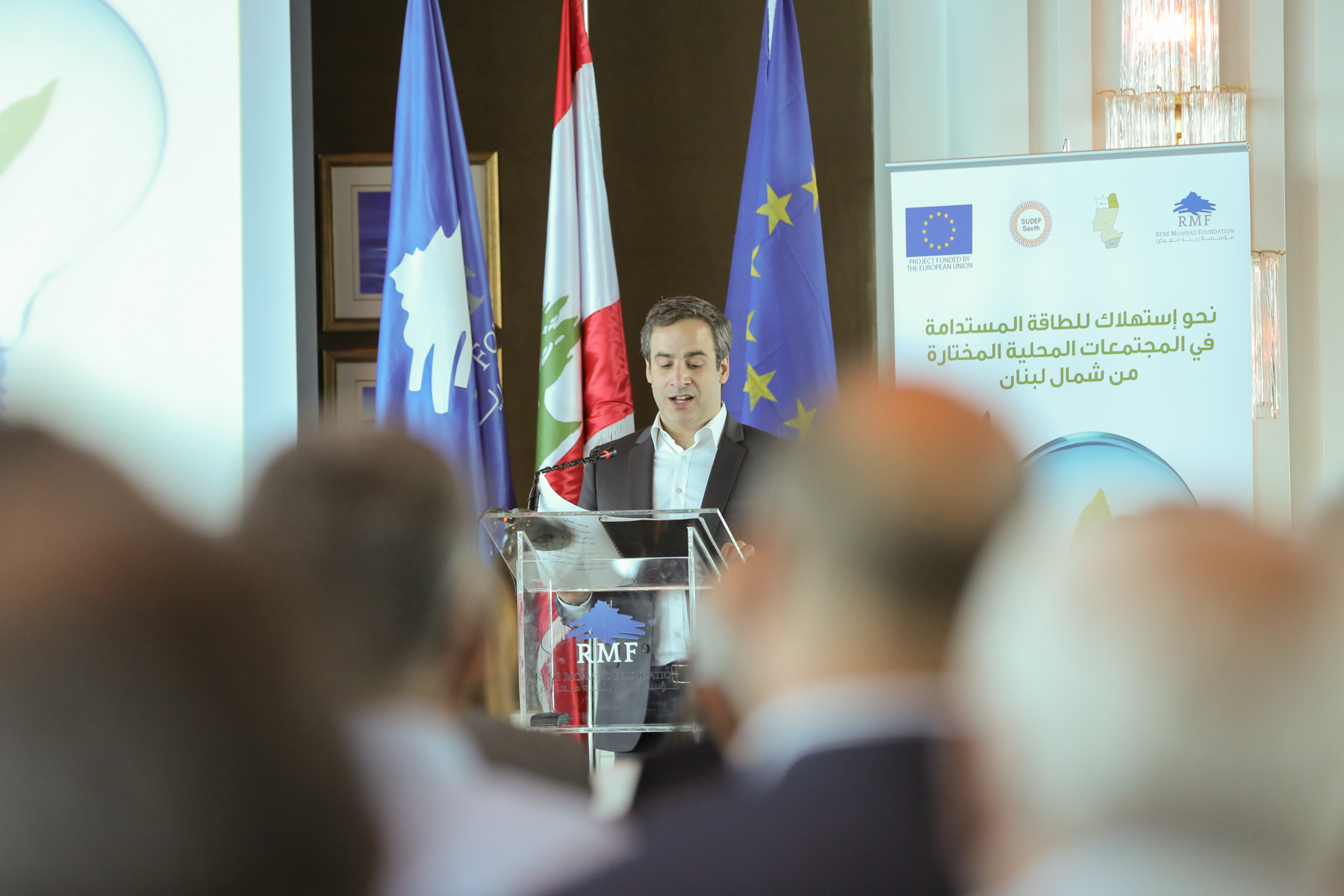
Moawad stated that “as the project started to be executed, RMF was already engaged in the execution of similar projects with international donors in the towns of Kfaryacheet (Zgharta), Bechmezzine (Koura) and Bnin (Akkar). More than 40 municipalities had applied through our foundation to benefit from similar projects funded by other donors…” He called for the propagation of this project on all the Lebanese citizens, “so that they pick up new habits and behaviour to protect their environment, their land, their natural wealth, their health and the future of their children.” He emphasized that “there are some bad habits that we have inherited that we need to change. The respect of the environment and using Alternative Energy has become a necessity. Therefore, we must work on spreading awareness at all levels…”
Moawad concluded by thanking the EU, “with which we share, along with all its country-members, a lot… starting with the human values and principles which represent a common heritage that unites us. The EU has always worked for the maintenance of Lebanon’s stability, in particular in the South where many of its country-members participate in the UNIFIL. It has also always supported the country’s official constitutional, security and military institutions, and has offered help in development work. The present project is a model and a sample of this support.” He also thanked the Ministry of Energy “represented by Minister Abi Khalil, for the care and efforts it has jointly deployed with us”, and the Municipality of Ardeh “for all its cooperation and remarkable enthusiasm in making the project succeed.” He added: “I cannot forget to extend my thanks to the 250 municipalities represented with us today. I hope that we will resume such cooperation in the very near future, as RMF, like it has accustomed you to, has broken and will always break all the regional, sectarian, political obstacles in order to serve the Lebanese human being wherever he is living, so that he remains firm in his land.”
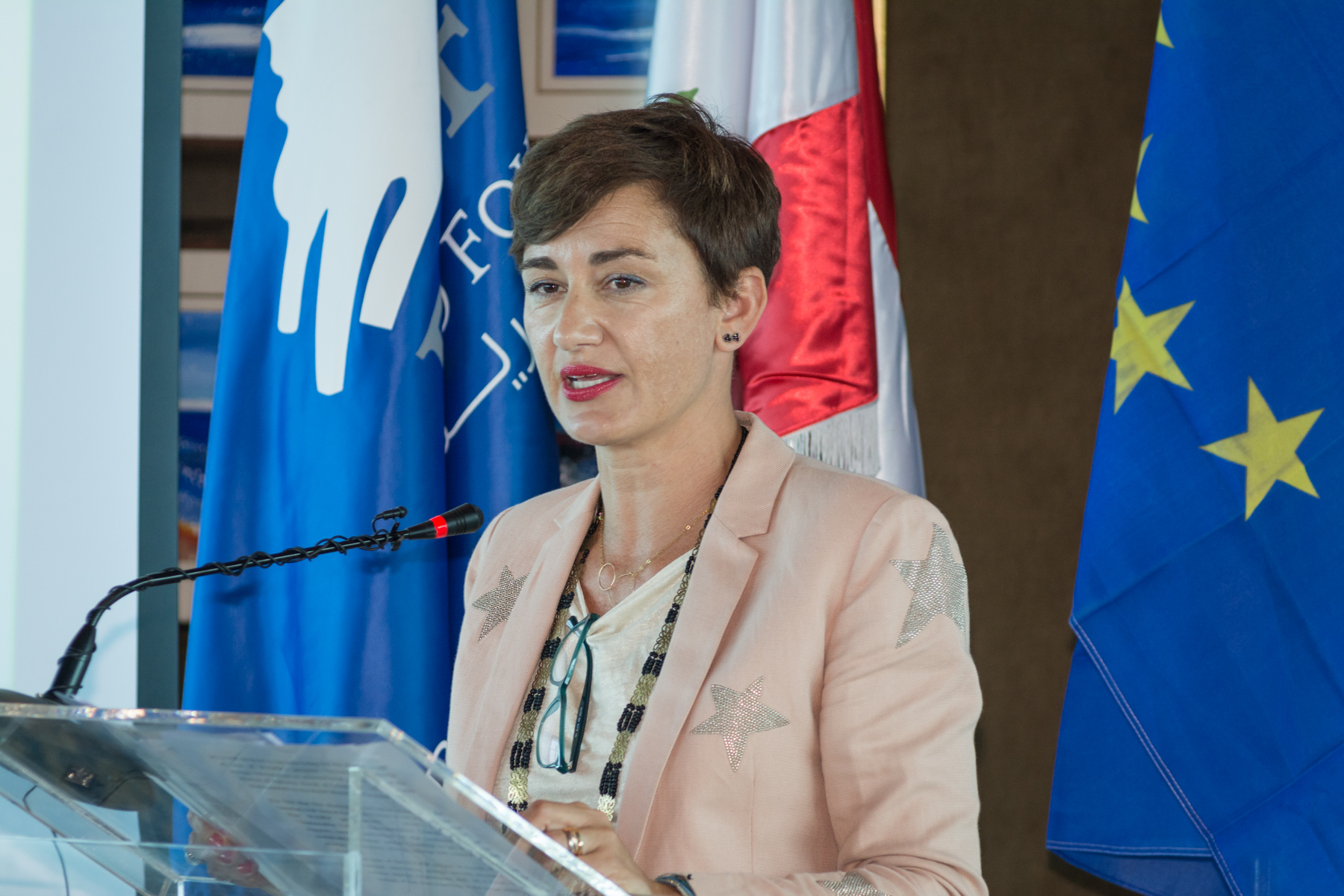
Mingasson
Irène Mingasson, Head of Unit Regional Cooperation Neighbourhood South DG NEAR, at the European Commission, spoke after Moawad. She expressed “her pride and happiness to participate in this concluding ceremony which is attended by a large gathering representing a big number of municipalities in Lebanon. She added: “ The SUDEP project works on providing support to the Local Authorities for the implementation of sustainable energy solutions, which leads to a higher capacity in using and preserving energy in the Southern part of the Mediterranean area, where Lebanon is situated.”
She noted that the EU “has funded this project in Ardeh, which led to better energy consumption, making it available through sustainable sources, and provided the municipality with income that allows it to execute other development projects. This is the true spirit of the present project, and the spirit that will lead future partnerships with municipalities and Local Authorities.”
Mingasson emphasized that “Local Authorities play a central role is finding and implementing sustainable solutions to energy challenges. This project has proven that these authorities represent a pushing force for change and improvement. This project is a model of successful partnership between donors, like the EU, NGOs, strongly present and active on the ground, like RMF, and Local Authorities that can bring about practical positive change.”
“Saving energy is a daily challenge in Lebanon, which became tougher with the Syrian crisis. The initiatives that lead to saving energy and generating power from renewable sources are of high importance. The EU plays a central role pushing towards sustainable energy to face the climate changes. Its objective is to build a political will and confidence at all levels to push towards a serious action to face the climate changes.”
Mingasson expressed the EU’s appreciation that Lebanon has taken important steps at the level of legislations and initiatives to generate energy from renewable sources. She reassured that “the EU remains committed to support Lebanon in this area, and will work on finding new partnerships with municipalities that are committed to enhance energy usage and adopt sustainable energies to protect the environment.”
She concluded by hoping that “this project be a model and will represent a motivation to have more similar projects in Lebanon and the region”, and she thanked RMF, the executing team and all who participated in the successful implementation of the project. She called for all “to combine their efforts and work for a green environment in Lebanon and the region, conclude this project proudly and look forward to taking more similar measures and actions in the future.”
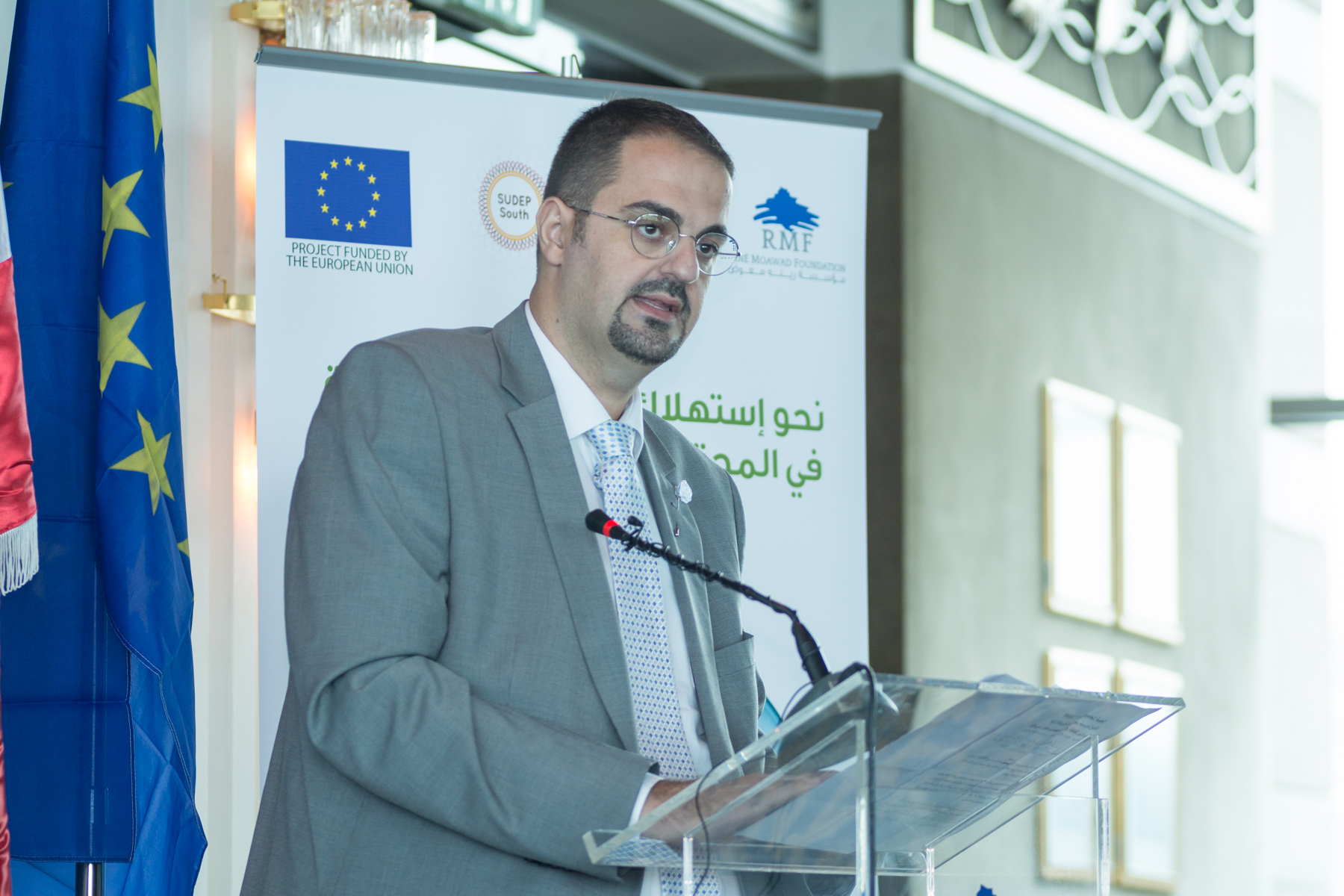
Abi Khalil’s representative
Representing Minister Cesar Abi Khalil, Dr Joseph Al Assad read out Abi Khalil’s speech for the occasion. In the speech, the minister emphasized that seeking sustainable solutions in the field of Energy “requires putting together a team-work between groups: NGOs, Civil Society Organisations and decentralised Local Authorities. As the public sector cannot come out alone anymore with solutions for long-term and deeply rooted crises. The principle of the State’s monopoly is outdated, while acknowledging though that the government still has to play the institutional role of guidance and inspection.”
He noted the need to give an important role to municipalities, to adopt decentralized production models such as renewable energy sources, and to look for burden-free financial funding sources which are to be found in coordination with the Central Bank. He encouraged investing in Energy Saving and Reduced Consumption projects, and increasing awareness campaigns and human empowerment capacities to keep up with modern technologies. He also disclosed that the Ministry of Energy is working on issuing a Decree to make solar energy based water heating systems and pumps compulsory for buildings under construction, and make it a condition to obtain construction authorizations. This would make us head towards the principle of ‘Green Construction’.
In the speech, Abi Khalil praised EU’s role, and congratulated the Municipality of Ardeh and RMF for their success in implementing this project and offering a model to be propagated to all the municipalities in Lebanon.
Honorary Shields
RMF’s Executive Director Michel Moawad and RMF’s General Director Nabil Moawad then presented honorary shields to Minister Abi Khalil’s representative Dr Joseph Al Assad, Mrs. Irène Mingasson, Mr. Nasser Al Hammami and the LCEC (Lebanese Center for Energy Conservation) represented by its General Manager Pierre El Khoury, in appreciation for the efforts they all put to make the project a success.
Two discussion-panels on Sustainable Energy and the funding of Green Loans
Two discussion-panels, animated by journalist and economy expert Maurice Matta, then took place.
In the technical session, a number of specialized experts shared their knowledge, experiences and success stories in various Sustainable Energy fields. The participants in the panel were: Dr Sorina Murtada (LCEC), Mr. Nasser Al Hammami (head of the SUDEP project team), Mr. Ousama Al Kaasamani (local and municipal development expert at the CES-MED project), Mr. Hassan Harajili (Director of the UN’s CEDRO project), and engineer Gilles Amine (Director of the UNDP’s DREG project in Lebanon).
In the second panel, which was under the topic ‘The special Green Loans funds’, the two speakers were: Engineer Milada Jabbour (head of the technical support team at the Central Bank’s financial department) and Engineer Ralph Estephan (Head of Energy and Technologies at the Kafalat company). They presented the various funding options available for environment friendly green projects.
The discussions between the participants and the speakers revolved about Sustainable Energy projects, and ways to get funding and benefit from loans.
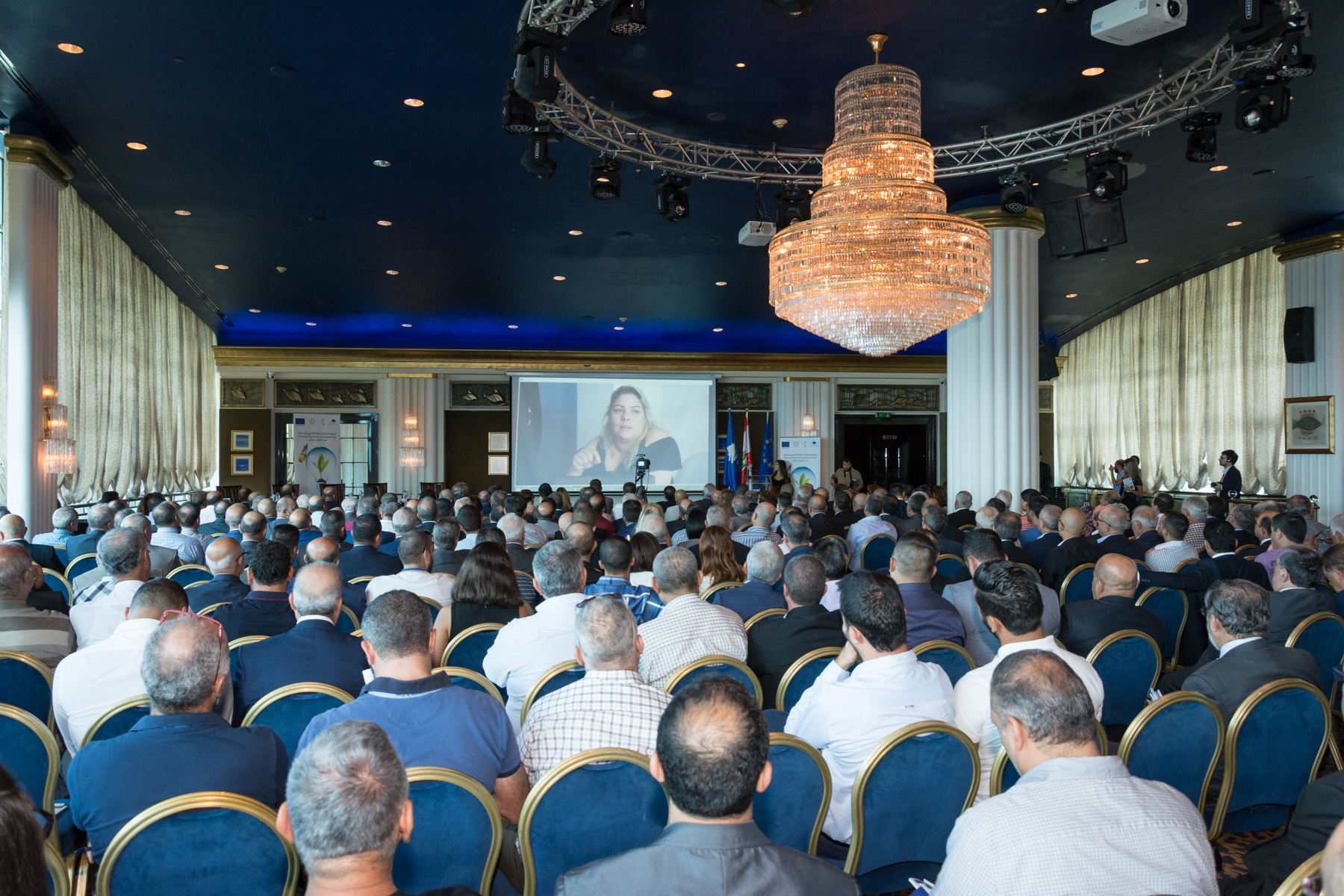
Website
A website for the project was launched on the occasion: www.rmfsudepardeh.com . It offers a complete guidebook on Raising Awareness on Energy Efficiency in Residential Buildings, which can be used by various local organisations and institutions.
A guidebook on Energy Efficiency consumption awareness was also distributed to all present.
The event was followed by a lunch offered by the organisers.
Brief description of the project
The ‘Towards Sustainable Energy Consumption In Select Local Communities Of Northern Lebanon’ project, is a project funded by the EU and implemented by RMF in partnership with the Municipality of Ardeh. It is part of the SUDEP projects
The project developed a strategy on Energy Efficiency in Ardeh and put a policy of Energy Efficiency for new buildings.
It also retrofitted street lights with high-efficiency LED to save energy, and developed a design guideline for energy efficient new municipal buildings. It installed PV systems to illuminate 6 main areas around the Ardeh town, and held training of staff on energy efficiency solutions and financing.
The project also included conducting energy audit on 300 homes, and implementing energy efficiency measures. It implemented public awareness sessions and developed, promoted and distributed 10,000 guidebooks on residential efficient energy use.
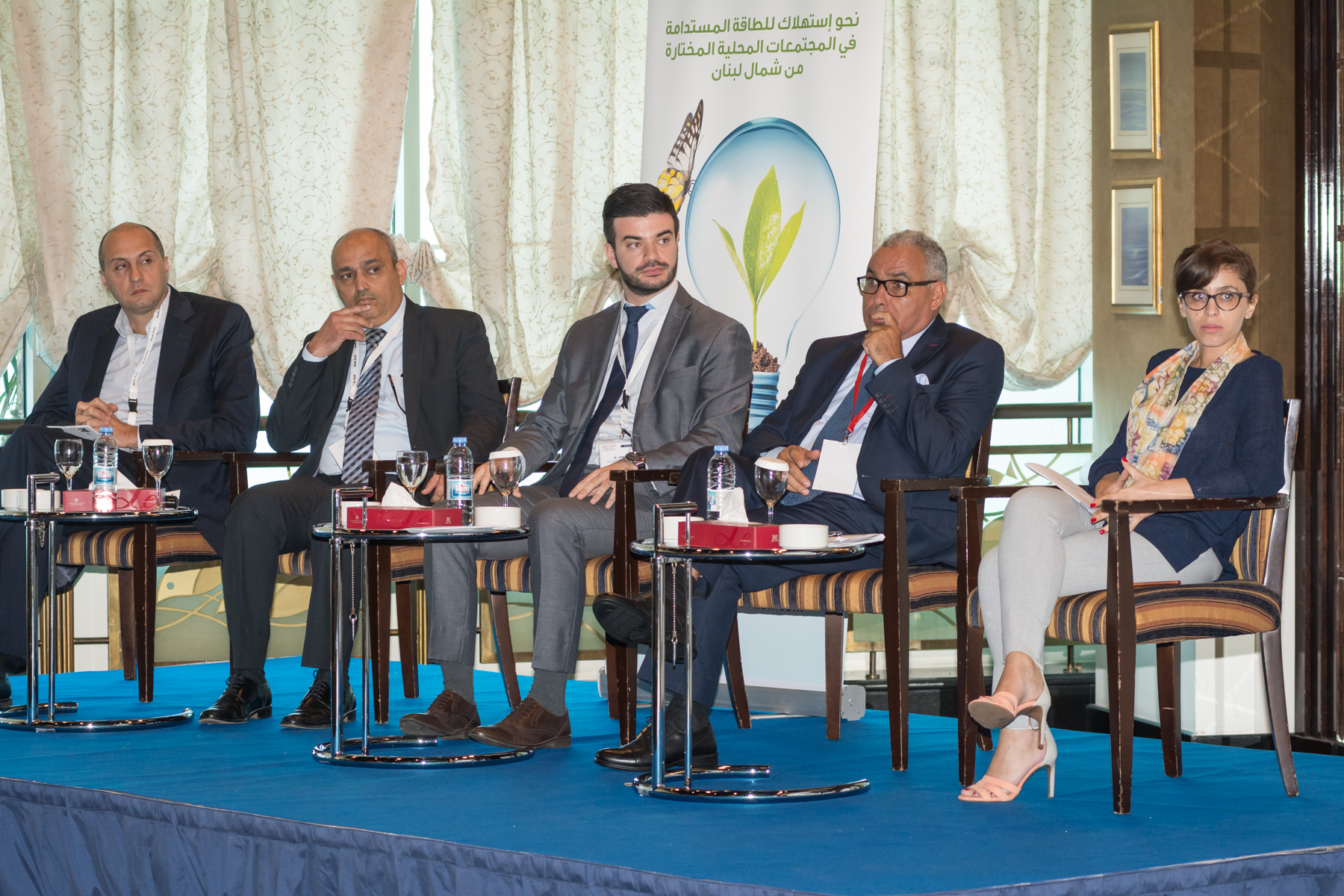






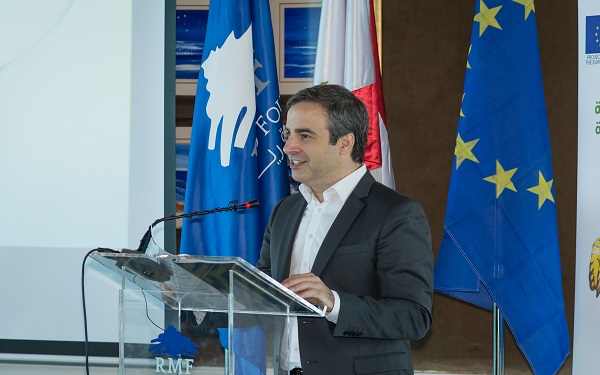
 العربية
العربية